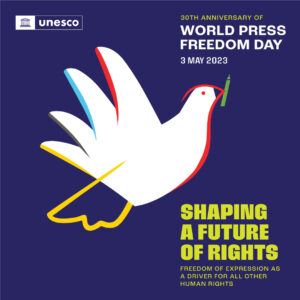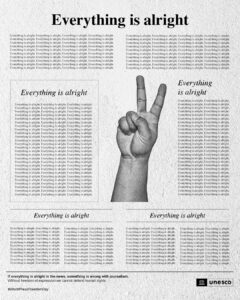This year's commemoration of World Press Freedom Day has a special significance: it marks 30 years since the United Nations General Assembly decided to proclaim May 3 as the day to, among other goals, remind governments "of the need to respect their commitment to press freedom.”
The date is an invitation for media professionals to reflect on press freedom and professional ethics. It also seeks to support media that are the target of restriction or abolition of press freedom. In particular, it seeks to remember journalists who lost their lives while carrying out their work.
"Thirty years after the first World Press Freedom Day, we can see how far we have come and how far we still have to go. May this Day be an opportunity to renew, within international organizations, our commitment to defend journalists and, through them, press freedom," said Audrey Azoulay, Director-General of Unesco, in her message on the occasion of this World Press Freedom Day.

UNESCO's campaign for World Press Freedom Day 2023. (Design: Unesco)
In her message, Azoulay recalled the serious impunity rate in crimes against journalists: Almost 9 out of 10 murders receive no justice. She also pointed out that the digital revolution has brought new challenges and that on this date it is important [to count on] the commitment of actors that "today exercise great control over access to information," that is, digital platforms.
"The issue is fundamental, as it is as much about protecting freedom of expression as it is about fighting misinformation and hate speech," Azoulay added.
The public is invited to join the commemoration with the message "All is well." "If all is well in the news, then something is wrong with journalism. And when something is wrong with journalism, we cannot protect human rights," according to Unesco.
Commemoration in New York and the Guillermo Cano Award
For this May 2, Unesco has scheduled the main commemoration of the day with a conference entitled "Shaping a future of rights: Freedom of expression as the engine of all other human rights," in New York.
The program includes several panels, including one entitled "Journalism to promote human rights," in which journalists will discuss how investigative journalism that exposes human rights violations can help promote concrete action. The panel will feature José Zamora, Exile's communications director and impact officer.
There will also be a panel with those who have a special mandate to promote freedom of expression such as the Special Rapporteurs of the UN, the IACHR, the African Union, or the Organization for Security and Cooperation in Europe.
The day culminates with the presentation of the UNESCO/Guillermo Cano World Press Freedom Prize, which "recognizes and honors the contributions of journalists, particularly those who risk their lives to provide essential information to the public." Established in 1997, the award honors the memory of Colombian journalist Guillermo Cano, director and owner of the newspaper El Espectador. He was murdered by drug trafficking mafias on Dec. 17, 1986 for his journalism.
Events for Latin America and the Caribbean
Within the framework of this commemoration, different panels will be held in Latin America or are focused on the region. Some of them require prior registration:
New and old challenges to guarantee freedom of expression in Latin America
Panel that seeks to discuss the main challenges in the region to exercise freedom of expression, both in the traditional media system and on the Internet.
Date: May 3
Time: 12:30 p.m. CST | 1:30 p.m. EST | 2:30 p.m. AST
Venue: Columbia University, New York, hybrid format.

World Press Freedom Day campaign Everything is alright. (Design: UNESCO)
Freedom of expression, a prerequisite for the enjoyment of other human rights in Latin America
This panel will focus on the following topics: 1) Strategies to adopt in the face of discourse that silences or incites hatred towards vulnerable groups that suffer structural discrimination in the region. 2) Freedom of expression and social protest in Latin America for the protection and defense of other rights. 3) Progress of the Inter-American Human Rights System in terms of access to information for the search for truth, collective memory and justice for human rights violations. And, 4) Milestones of Inter-American jurisprudence regarding the link between freedom of expression and the rule of law, gender equality and care for the environment.
Panelists will be Ricardo Pérez Manrique, President of the Inter-American Court of Human Rights; Pedro Vaca, Special Rapporteur for Freedom of Expression of the Inter-American Commission on Human Rights; Agnès Callamard, Secretary General of Amnesty International; and Ricardo Calderón, Colombian journalist and investigative reporter. It will be moderated by Edison Lanza, Unesco consultant and former special rapporteur of the IACHR. Closing remarks will be given by Catalina Botero, consulting director of Columbia Global Freedom of Expression, member of the Meta Council, and director of the UNESCO Chair in Freedom of Expression at the Universidad de Los Andes.
Date: May 3
Time: 2:20 p.m. CST | 3:20 p.m. EST | 4:20 p.m. AST
Venue: Columbia University, New York, hybrid format.
Social Media 4 Peace in Colombia: Contributing to the regional dialogue on content moderation
This event will discuss the main findings of research conducted by Unesco's Social Media for Peace - SM4P project in Colombia on social media and the self-regulatory and regulatory framework governing the moderation of online content that is illegal and/or risks significant harm to democracy, in accordance with international human rights law and relevant jurisprudence.
Date: May 3
Time: 4 p.m. CST | 5 p.m. EST | 6 p.m. AST
Venue: Columbia University, New York (in-person event only)
Democracy and freedom of expression in Uruguay: Civil society's agenda
Members of civil society will discuss the main challenges regarding freedom of expression in Uruguay. The topic will be approached from different perspectives, such as journalists' rights, audience rights, access to public information, digital rights, community media and trade union organizations, among others.
Date: May 9
Time: 9:00 a.m. - 12:30 p.m., Uruguay (AST)
Venue: UNESCO Regional Office in Montevideo.